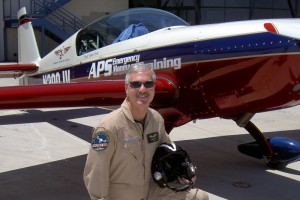
As I count up the number of flight operations – different soaring operations, aerobatic flight schools, aerobatic teams, corporate flight departments, and aircraft manufacturers with different locations, aircraft, and management – APS Texas is the 12th operation I have flown with. There are lessons to be learned from each previous experience; lessons that can be used to make APS Texas a more professional and safe operation.
No doubt you have heard the term Safety Management System (SMS) used recently. Although not yet required by the FAA, they are supportive of the concept of SMS, as explained in this previously issued Advisory Circular: Introduction to SMS. If you are like me, the term SMS may seem unfamiliar and even a little intimidating at first. It is really just built around the concept derived from the earliest days of aviation of putting safety in front of other considerations in order to reduce risk.
Though not fully required in the US at this time, many foreign regulators currently have requirements for SMS in place as it has been promoted by the International Civil Aviation Organization (ICAO). Increasingly, insurance underwriters are embracing and requiring their insured to have a SMS as a means of reducing accidents and thus the underwriters financial exposure. At this time APS is developing a formal SMS as part of certification to the International Standard for Business Aircraft Operations (IS-BAO), but it is possible for others to use basic SMS principles without going through the official certification process.
So how does all of this relate to past flight operational experience? When we evaluate the safety of our operations, we do so based on our own experience and the experiences of others. A review of the overall accident records for either general or commercial aviation will show that Loss of Control In-flight (LOC-I) is far and away the leading cause of fatalities and fatal aircraft accidents world wide. Because LOC-I is primarily focused on the capabilities of pilots, efforts to reduce our exposure to risks in aviation should include elements of Upset Prevention and Recovery Training (UPRT).
As APS Texas evaluates our operations from an SMS perspective, we begin from the established baseline of safety and professionalism in place at the UPRT operations of our APS headquarters in Mesa, AZ. and the over 16 year history of APS experience in UPRT. From that benchmark we will be looking at our new APS Texas operations from an SMS perspective to see how we can maintain and improve the APS record of safety in our operations. We hope that as you take a look at your own flight operations, you will realize that UPRT for yourself or your pilots is one of the best investments in aviation safety that you can make. When you do we hope you will come visit us at APS Texas.
We look forward to serving your Upset Prevention and Recovery Training needs whether in our aircraft or through the use of a full-flight simulator.
Randall Brooks – Director of Flight Operations, APS Texas




Comments: